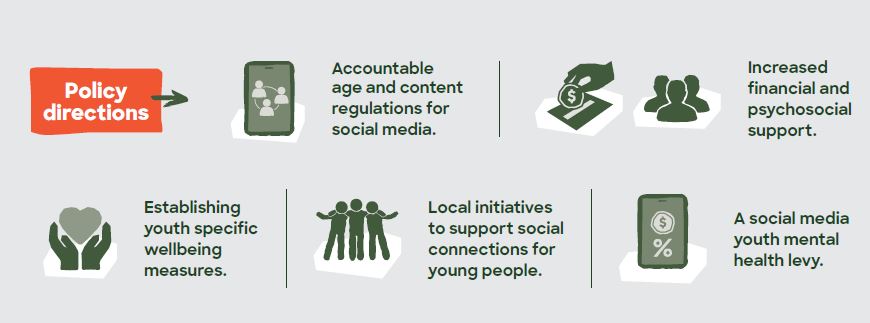Social connection, increased financial support, more regulation of social media and a tax to support youth mental health are among the solutions developed in consultation with two global leaders in youth mental health policy – Orygen Institute and the Policy Institute at King’s College London (KCL).
The recommendations have emerged from a Policy Lab facilitated by Orygen, which brought together young people, youth mental health researchers, government stakeholders, policy advisers and representatives from leading mental health organisations such as Beyond Blue, Mental Health Australia, Black Dog Institute and batyr to examine what governments can do to tackle declining youth mental health.

FULL REPORT: Responding to the social and economic drivers of youth mental health
Director of Policy and Engagement at Orygen, Vivienne Browne, said that social media emerged as a strong theme in Policy Lab discussions, with a new tax on social media companies proposed to increase funding for youth mental health.
“The Policy Lab identified loneliness amongst young people as a key factor in mental ill-health and distress, and explored the ways social media, social connection and loneliness are complex intersecting issues,” Browne said.
“Interestingly, while social media is often seen as a way to bring people together, many feel that it actually exacerbates feelings of loneliness and isolation.
“The proposed levy on social media companies could pay for much-needed mental health supports for young people, particularly around increasing social connection in the ‘real world', with opportunities for people to access activities, groups and services in their community.”
Browne said that the Policy Lab was not about simply discussing the issues, but about coming up with real-world solutions, backed by research and policy experts, that governments could consider.
“The Policy Lab outcomes are an important starting point for including young people, researchers and policymakers in solutions to problems such as intergenerational inequality and lack of financial stability, offering new perspectives on these complex issues,” Browne said.
“With something like social media, for example, we know that older generations are quick to blame smartphones and technology for the decline in youth mental health, and while younger people also acknowledge these issues, they point to other important driving factors, such as cost-of-living pressures, insecure work and climate change – and it's important these voices are heard in decision-making.”
Discussion among Policy Lab participants developed actions focused on enhancing real-world connections and interactions, the potential of shared learning between cultural groups, and creating more opportunities to connect to arts and culture, community activities, sports and volunteer organisations.
Economic factors also featured strongly in discussions, with suggested actions predominantly focused on structural responses such as increases to social service payments, tax reforms, reducing financial barriers to accessing essential health services and reducing the costs of education.
Alexandra Pollitt, Director of Research at the Policy Institute, King's College London said the Policy Lab outcomes demonstrate the value of bringing together people with different expertise and lived experience to explore issues and develop solutions in response to ‘megatrends’ impacting youth mental health.
“We have seen major societal shifts coinciding with a sharp increase in mental ill-health in young people around the world,” Pollitt said.
“There isn’t just one cause for declining youth mental health, so there needs to be more than one solution to turn this trend around.
“Bringing together young people and mental health researchers with policymakers and government is key to developing feasible, practical solutions that can make a real difference in the short to medium term.”
About Policy Labs
The Policy Lab model, developed by the Policy Institute at King’s College London, is a structured workshop designed to explore the issues, questions, and evidence around a specific policy question, then focus on possible answers to the question and the mechanisms available to translate this into policy advice.
The inclusion of policymakers as participants in the lab allows for a focus on policy solutions that are feasible for governments, as well as building relationships between policymakers and those impacted by the issues.
About Orygen
Orygen is Australia’s Centre of Excellence in Youth Mental Health and is renowned globally as a pioneering organisation in the field.
With 75% of all mental ill-health emerging by the age of 25, Orygen was established to address the urgent needs of young people aged 12–25 by bringing together expertise in clinical care, research, training, policy development and advocacy to realise one vision: for all young people to enjoy optimal mental health throughout their lives.
LIVE PANEL EVENT: Generations in Conversations - what they said